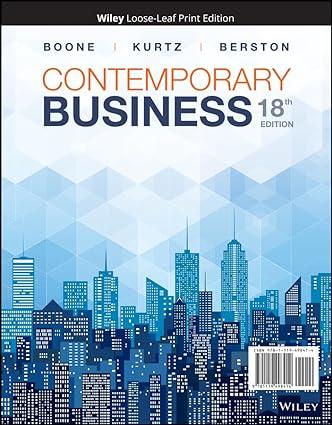At TripAdvisor, a global travel website with user-generated reviews and opinions , competition within the global travel
Question:
At TripAdvisor, a global travel website with user-generated reviews and opinions, competition within the global travel industry remains cutthroat and intense. Steve Kaufer is the co-founder and CEO of Trip Advisor, and taped on his office door is a sign that reads “Speed Wins.” The sign, handwritten by Kaufer when he first started TripAdvisor in 2000, is the company's informal and internal motto. As the company has grown to over 3,000 employees, the sign has been moved multiple times.
One of the basic rights under the private enterprise system happens to be fair competition. Because it is so inexpensive for competitors to start up, there are many unknowns, and in a business environment in which things move so quickly, one of the core aspects of a company's response must be speed and fast response. “If you don't respond quickly, you will kind of go through this decay,” says the company's President of Vacation Rentals. TripAdvisor boasts over 570 million reviews and opinions, 60 million photos from travelers worldwide, and more than 7 million hotels, bed and breakfasts, specialty lodging, vacation rentals, restaurants, and attractions in 136,000 destinations. With those kinds of numbers, TripAdvisor remains focused on creating value for its users and, using its global footprint, to continuously acquire new knowledge of what users respond to most favorably.
This chapter explores the ways companies are admired—and TripAdvisor certainly falls into that category. The company has earned the reputation as one of the most highly recognized, used, and trusted travel websites in the global travel industry. TripAdvisor's customers are thrilled with the company's quick and constant improvements and new features on its site that services hundreds of millions of visitors each month in more than two dozen languages.
The company remains focused on the quality of what is produced and what goes on its site, and with volumes of information, its meticulously built infrastructure must support it well and accurately.
TripAdvisor fosters managerial success through a culture that promotes finding successful outcomes while sponsoring novelty, new ideas, and even failure. Tolerance for failure in the organization—not out of sloppiness but from outcomes that just didn't work out—is the way TripAdvisor's management team subscribes to learning, which results in better long-term decision making.
One of the basic inputs of an economic system happens to be entrepreneurship.
TripAdvisor began by accidental discovery in 2000 when Steve Kaufer, a classic entrepreneur, was planning a vacation to Mexico for his family. During the planning process Kaufer's wife realized her husband's frustration with unbiased hotel reviews—and the lack of user-generated information and feedback from travelers. Sure, plenty of breathtaking pictures and beautifully printed and designed brochures from travel agents were available. Rather than reading what hotel operators were saying about themselves, what Kaufer really wanted to know was what customers were saying about the hotels. This lack of information is what ultimately led Kaufer to create a firsthand, user-generated feedback system and platform.
Another basic input of an economic system happens to be human resources, and TripAdvisor is acutely focused on its hiring practices to ensure a cultural fit. As part of its “Speed Wins” culture, TripAdvisor hires people who wish to get out of a larger bureaucratic company environment as well as those with a predisposition to moving quickly. The company develops its employees to take knowledge and convert it into interesting user experiences not only for its travelers, but for business advertisers, too.
Leveraging technology, the TripAdvisor site attracts over 455 million users a month in search of firsthand travel research and experience. Kaufer admits that the biggest change impacting his business is the way in which people use technology. TripAdvisor has adapted to the changing nature of today's business and technology environment. As internet usage has moved to a mobile device, TripAdvisor has invested in in-destination functionality for their products, so that people can use the application not just to plan their trip, but also in short bursts while they are moving around and using their mobile phones. Kaufer's goal is for his customers to bring the TripAdvisor experience with them on their trip. In addition, virtual reality and virtual tours—where travelers can experience places before they even go—are becoming part of what Kaufer refers to as his company's universal value proposition—that which allows travelers the ability to share their opinion thereby allowing other travelers the ability to make their decisions based on those opinions.
Questions for Critical Thinking
1. How does TripAdvisor use the four basic inputs of an economic system?
2. Steve Kaufer, an entrepreneur, has said, “I watch with amazement at how some of the companies these days start up without much of a notion of how they're going to make money. But just if they get a lot of eyeballs, if they got a lot of usage, they'll figure it out. I'm the first to say that several companies have figured that out in spades, and they're wonderfully successful. Amen. I want to remind people, that is the exception to the rule.” From what you can tell, how has Kaufer made TripAdvisor a success?
3. How has the company earned the reputation as the most recognized, used, and trusted travel website? What are the admirable traits of TripAdvisor? (You may want to go to the TripAdvisor.com website to learn more about the company.)
4. This chapter discusses that at the heart of every business endeavor is an exchange between buyer and seller. How does this relate to TripAdvisor's business?
Step by Step Answer:

Contemporary Business
ISBN: 9781119498414
18th Edition
Authors: Louis E. Boone, David L. Kurtz, Susan Berston





